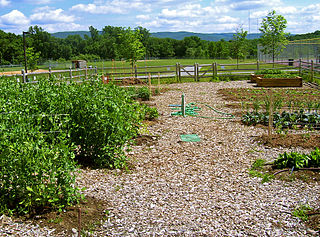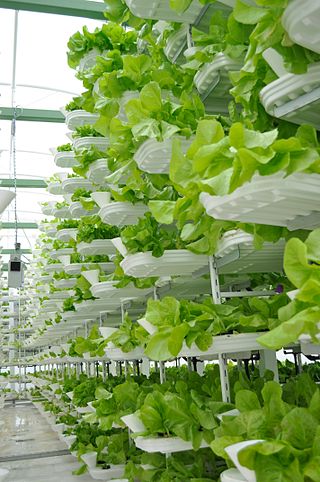
Aquaculture, also known as aquafarming, is the controlled cultivation ("farming") of aquatic organisms such as fish, crustaceans, mollusks, algae and other organisms of value such as aquatic plants. Aquaculture involves cultivating freshwater, brackish water and saltwater populations under controlled or semi-natural conditions, and can be contrasted with commercial fishing, which is the harvesting of wild fish. Aquaculture is also a practice used for restoring and rehabilitating marine and freshwater ecosystems. Mariculture, commonly known as marine farming, is aquaculture in seawater habitats and lagoons, as opposed to freshwater aquaculture. Pisciculture is a type of aquaculture that consists of fish farming to obtain fish products as food.
The following outline is provided as an overview of and topical guide to sustainable agriculture:

The following outline is provided as an overview of and topical guide to organic gardening and farming:

Urban agriculture refers to various practices of cultivating, processing, and distributing food in urban areas. The term also applies to the area activities of animal husbandry, aquaculture, beekeeping, and horticulture in an urban context. Urban agriculture is distinguished from peri-urban agriculture, which takes place in rural areas at the edge of suburbs.

Aquaponics is a food production system that couples aquaculture with hydroponics whereby the nutrient-rich aquaculture water is fed to hydroponically grown plants.

Vertical farming is the practice of growing crops in vertically stacked layers. It often incorporates controlled-environment agriculture, which aims to optimize plant growth, and soilless farming techniques such as hydroponics, aquaponics, and aeroponics. Some common choices of structures to house vertical farming systems include buildings, shipping containers, underground tunnels, and abandoned mine shafts.
Controlled-environment agriculture (CEA) -- which includes indoor agriculture (IA) and vertical farming—is a technology-based approach toward food production. The aim of CEA is to provide protection from the outdoor elements and maintain optimal growing conditions throughout the development of the crop. Production takes place within an enclosed growing structure such as a greenhouse or plant factory.

Will Allen is an American urban farmer based in Milwaukee and a retired professional basketball player.

Aquaculture started to take off in New Zealand in the 1980s. It is dominated by mussels, oysters and salmon. In 2007, aquaculture generated about NZ$360 million in sales on an area of 7,700 hectares. $240 million was earned in exports.
Microponics, in agricultural practice, is a symbiotic integration of fish, plants, and micro-livestock within a semi-controlled environment, designed to enhance soil fertility and crop productivity. Coined by Gary Donaldson, an Australian urban farmer, in 2008, the term was used to describe his innovative concept of integrated backyard food production. It is important to note that while "microponics" had been previously used to refer to an obscure grafting method in hydroponics, Donaldson's application of the term was derived from the amalgamation of micro-livestock (micro-farming) and the cultivation of fish and plants, a practice commonly known as aquaponics.
Florida Certified Organic Growers and Consumers, also known as Florida Organic Growers or FOG, is a non-profit organization founded in 1987. It is classified as a 501(c) corporation. One of the main facets of FOG is Quality Certification Services, a program that extends through 30 states and 14 countries. FOG is also concerned with community outreach and education in order to promote healthy organic lifestyles and social equity.
Sweet Water Organics, Inc. was an urban farm located in the Bay View neighborhood of Milwaukee, Wisconsin. Founded in 2008 by Milwaukee entrepreneurs Josh Fraundorf and James Godsil, Sweet Water's stated mission was to provide fresh, safe food for the community by employing methods of aquaponics and hydroponics that produce a variety of consumables while minimizing its impact on the local environment.
International Institute of Rural Reconstruction, also known as IIRR is a non-profit organization that helps empower rural communities by making them self-sufficient. By offering programs across health, education, environment, and livelihood, its goal is to have rural communities take charge of their own success. The organization has delivered programs to more than 40 countries in Asia, Africa, and Latin America and directly impacted the lives of over 19 million people as of 2019.
Saltwater aquaponics is a combination of plant cultivation and fish rearing, systems with similarities to standard aquaponics, except that it uses saltwater instead of the more commonly used freshwater. In some instances, this may be diluted saltwater. The concept is being researched as a sustainable way to eliminate the stresses that are put on local environments by conventional fish farming practices who expel wastewater into the coastal zones, all while creating complementary crops.

Recirculating aquaculture systems (RAS) are used in home aquaria and for fish production where water exchange is limited and the use of biofiltration is required to reduce ammonia toxicity. Other types of filtration and environmental control are often also necessary to maintain clean water and provide a suitable habitat for fish. The main benefit of RAS is the ability to reduce the need for fresh, clean water while still maintaining a healthy environment for fish. To be operated economically commercial RAS must have high fish stocking densities, and many researchers are currently conducting studies to determine if RAS is a viable form of intensive aquaculture.

Karen Washington is a political activist and community organizer fighting for food justice.
Keep Growing Detroit is an organization dedicated to food sovereignty and community engagement in the cities of Detroit, Hamtramck, and Highland Park. Founded in 2013, the program designs and implements initiatives that promote the practice of urban agriculture as a mode of food justice for underrepresented communities, particularly those who do not have access to healthy food options. The goals of Keep Growing Detroit are to educate and empower community members using urban agricultural practices. Programs such as the Garden Resource Program and Grown in Detroit served as catalysts, laying the foundation for Keep Growing Detroit.
Urban Growers Collective is a non-profit organization that builds urban farms, gardens, and provides fresh foods primarily in underprivileged areas in the West and South Side of Chicago. The organization was founded in Chicago, Illinois in 2017 by Erika Allen and Laurell Sims. As of 2019, there are eight urban farms that have been created and are run by Urban Growers Collective.
East New York Farms! (ENYF) is a community organization created to address food justice issues in the East New York neighborhood of Brooklyn, New York.

Erika Allen is the co-founder and CEO of Urban Growers Collective. In 2022, she won the 2022 James Beard Leadership Award.











